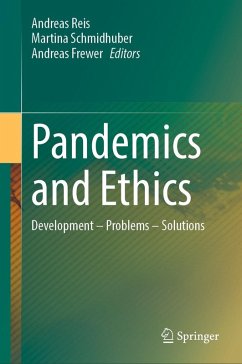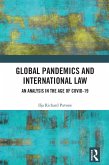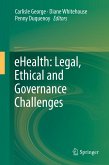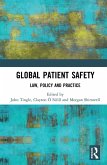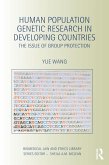This overview volume, written by renowned experts from medicine, the humanities, and the social sciences, addresses the central ethical issues in pandemics. Focusing on the disciplines of philosophy, public health, bioethics, and law, the book discusses issues of resource allocation, triage, and research, as well as restrictions on freedom, rights and duties of health professionals, and ethical aspects of digital medicine in crises. The volume is intended to serve as a handbook and to provide physicians as well as nurses, politicians and interested laypersons with valuable advice on how to deal with the difficult moral problems of epidemics and pandemics.
With expert contributions by Steffen Augsberg (Giessen), Klaus Bergdolt (Cologne), Nikola Biller-Andorno (Zurich), Walter Bruchhausen (Bonn), Christiane Druml (Vienna), Hans-Jörg Ehni (Tuebingen), Alice Faust (Berlin), Sophia Forster (Erlangen-Nuremberg), Andreas Frewer (Erlangen-Nuremberg), Sara Gerke (Boston/Cambridge), Patrik Hummel (Eindhoven), Elena Jirovsky-Platter (Vienna), Katharina Kieslich (Vienna), Otmar Kloiber (Ferney-Voltaire), Ulrich H. J. Körtner (Vienna), Eva Kuhn (Bonn), Georg Marckmann (Munich), Timo Minssen (Copenhagen), Tim Nguyen (Geneva), Barbara Prainsack (Vienna), Andreas Reis (Geneva), Anita Rieder (Vienna), Stephan Rixen (Bayreuth), Lana Saksone (Berlin), Martina Schmidhuber (Graz), Harald Schmidt (Philadelphia), Annabel Seebohm (Brussels), Daniel Strech (Berlin), Sebastian Wäscher (Zurich), Hans-Werner Wahl (Heidelberg), Stefanie Weigold (Berlin), and Lena Woydack (Berlin). The translation was done with the help of artificial intelligence. A subsequent human revision was done primarily in terms of content.
Dieser Download kann aus rechtlichen Gründen nur mit Rechnungsadresse in A, B, BG, CY, CZ, D, DK, EW, E, FIN, F, GR, HR, H, IRL, I, LT, L, LR, M, NL, PL, P, R, S, SLO, SK ausgeliefert werden.

